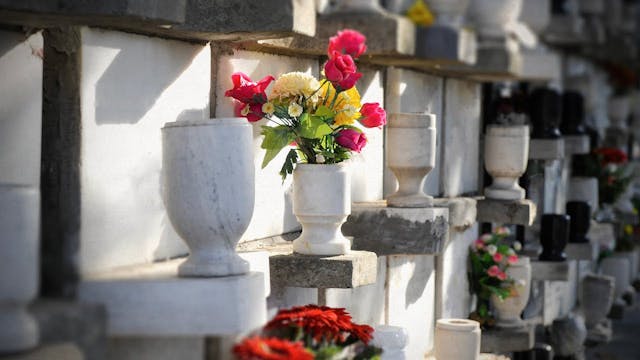What Does Anointing of the Sick Do?
Eternal Rest: The Art of Dying Well
•
2m 3s
There are five effects of the Anointing of the Sick. It unites us to Christ’s Passion, strengthens us to endure suffering, forgives our sins, restores our health if it’s conducive for our salvation, and prepares us to enter eternal life.
The Anointing of the Sick unites us to Jesus Christ and his sufferings, both for our own good and that of the whole Church. By uniting us to Jesus’ Passion, we receive consolation and peace; our suffering becomes salvific and redemptive. It strengthens us in our trial, gives us increased courage and perseverance, and helps us bear our cross with greater peace.
“Anxiety is removed. We can face death with peace and welcome it with joy.”
As one of the sacraments of healing, the Anointing of the Sick absolves sins if we’re unable to go to Confession. Sometimes even our physical health is restored, if it’s conducive for the salvation of our soul. Lastly, Anointing of the Sick prepares us to pass from death to eternity, replacing fear with faith, so that we may pass from this life to the next with hope.
Read more about the five effects of the Anointing of the Sick in the Catechism of the Catholic Church.
Up Next in Eternal Rest: The Art of Dying Well
-
How Do I Respond To a Loved Ones Term...
It’s important for us to acknowledge reality with our loved ones, and simply be present with them. Let them know they’re not alone.
People don’t want to talk about death or dying. Fear of the unknown, anxiety, suffering... most people would rather avoid discussing the topic entirely, but never...
-
Why Shouldn't We Take Cremated Remain...
Catholics must keep remains intact, lay them to rest in a sacred space, and maintain full respect for the body.
In the aftermath of loss, family members and friends are often left reeling, grasping for something to hold onto. This desire for stability or the chance to say goodbye is certainly ...
-
Why Should Cremation Be Done After A ...
The Church celebrates a different funeral rite depending on whether the full body or cremated remains are present.
If cremation is necessary, the Church prefers the celebration of the funeral Mass first, then the cremation. Disposition of the cremains takes place several days later.
“If one...



